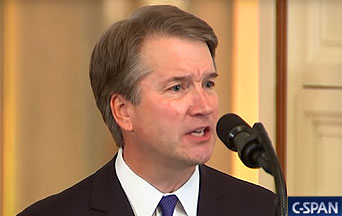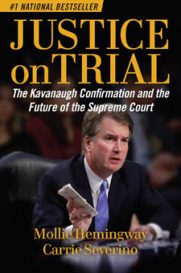
Mollie Hemingway and Carrie Severino,
Justice on Trial: The Kavanaugh Confirmation and the Future of the Supreme Court
(Washington, DC: Regnery, 2019)
More than any other country, the United States is rooted in ideals. Americans share no common ethnicity or religion, and increasingly no common language. The nation is divided into two general political camps that vilify each other. One thing that keeps America together as a nation is the assumption that fairness and equality before the law will guide government and citizens alike.
Truth, justice, and the American way—this is not a cliché; it is a chain of reasoning. The American way is grounded in justice, and justice, in turn, is grounded in truth.
However, truth—the bedrock of justice—has been driven out of the public sphere. When a country’s leaders mock truth, what becomes of justice, and of that country’s national mores?
For the answer to this question, one need look no further than Federalist editor Mollie Hemingway and Judicial Crisis Network policy director Carrie Severino’s new book, Justice on Trial: The Kavanaugh Confirmation and the Future of the Supreme Court. This tightly-written, detail-rich volume is sure to become the definitive text on one of the most shameful episodes in recent American history: the attempted takedown of a Supreme Court nominee and the twisting of justice for purely political ends.
Eternal and Natural Law: The Foundation of Morals and Law
Everyone knows the outline of the sad tale. Brett Kavanaugh is a Catholic man, who has spent his career building a sterling, spotless record as a judge. His peers universally respect him. He was nominated to the Supreme Court by President Donald Trump to replace Justice Anthony Kennedy, who retired in late June of 2018. Members of the opposition party in the Senate used the opportunity to advance tough re-election campaigns as voters in well-to-do districts grew frustrated with an inability to impeach a populist president. They decided to turn the confirmation hearings for Kavanaugh into a political feeding frenzy.
Several key senators abandoned Senate rules and basic decorum as they hounded Judge Kavanaugh, clearly hoping that the abuse would compel him to withdraw (while redounding to their political advantage). Allies in the media entered into a bidding war to outdo the grandstanding senators. Dishonest lawyers then joined in, raking up outrageous and salacious falsehoods levied against the judge. The circus spun on for weeks as the public watched in dismay. Elected officials disgraced themselves and the institutions that are meant to safeguard the ideals that hold the country together.
The centerpiece of the opposition’s tactical disruption was Dr. Christine Blasey Ford. Dr. Ford erupted onto the national scene when California’s Senator Dianne Feinstein leaked to the press, against Dr. Ford’s express wish for privacy, her letter to Feinstein alleging that Brett Kavanaugh had sexually assaulted her when both were teenagers. Kavanaugh denied the charges. Dr. Ford’s lawyers, both veteran Clinton operatives who many suspected were pressuring Dr. Ford to testify, flanked Dr. Ford while she fumbled through her Senate committee hearing. Cross-examination by an experienced Arizona prosecutor revealed glaring inconsistencies in her account, but this did little to dissuade Kavanaugh’s critics.
The Civilization of the Lie and Its Rejection of Truth
The media, for their part, had a field day, abandoning all pretense of neutrality as they engaged in wild speculation. They showed no restraint in lending credence to even the most implausible of the other copycat claims that sprung up across the country.
Kavanaugh eventually produced evidence of his innocence and made an impassioned speech in defense of his good name. However, the damage was done. Americans had witnessed yet another spectacle of power-politics blinding citizens to broader considerations and long-term consequences for the nation as a whole.
Hemingway and Severino title their book “justice on trial,” and the Kavanaugh hearings were certainly a crucible where justice was tested. However, what strikes the reader of this excellent book is how many lies can be found at the heart of the entire sad affair.
Yes, justice was run through the wood chipper during the Kavanaugh hearings. Americans’ faith in their elected leaders was reduced to a pulp by the bad behavior on display at the Senate hearings and beyond. But the reason that Kavanaugh was railroaded has much more to do with truth than with justice.
The Kavanaugh episode must be seen in the context of the past forty years of political history. For example, the Kavanaugh hearings bring back painful memories of Clarence Thomas’ confirmation hearings in 1991. Thomas, nominated by Pres. George H. W. Bush to replace Thurgood Marshall on the Supreme Court was calumniated by a woman who leveled sexual harassment charges against him. The charges were outlandish and never substantiated, and Thomas was confirmed only after he rightly condemned the Senate hearings as a “high-tech lynching.” Thomas, in turn, was preceded on the hot seat by Robert Bork, who was also blindsided by baseless accusations following his nomination.
Will Abortion Doom Democrats in the Next Election?
What does this have to do with truth? Why were three good men—Bork, then Thomas, and then Kavanaugh—so viciously defamed? What did their opponents stand to lose? The answer, in one word, is abortion. (One of Ford’s lawyers, Debra Katz, admitted as much during a recent speech at the University of Baltimore.) The Democrats realized that their agenda rests on a lie, namely that a child in the womb is not a person. If courageous judges like Thomas, Bork, and Kavanaugh were to subject that claim to scrutiny, it would not hold up in court. Therefore, instead of arguing for abortion on its“merits,” which is impossible, the Democrats decided for the ad hominem approach.
The injustice that Bork, Kavanaugh, and Thomas endured was thus a product of untruth. At the heart of the abortion regime’s central lie, there spools out an endless stream of lesser lies, targeting anyone who would stand up and speak the truth.
Remember that Robert Bork’s first accuser was the late Senator Edward Kennedy. Why would Kennedy, a nominal Catholic, lead the charge against Bork? Abortion. Clarence Thomas’ enemies (including then-Senator Joe Biden) lynched his good character for the same reason. Kavanaugh, too, was mobbed in the press out of fear that he might join with Clarence Thomas and overturn Roe v. Wade and other cases, which gave the imprimatur to abortion-on-demand in the United States.
 Learn All About the Prophecies of Our Lady of Good Success About Our Times
Learn All About the Prophecies of Our Lady of Good Success About Our Times
Thus, the initial lie that an unborn baby is not a person is the source of the other lies about right and wrong that follow. All the falsehoods and slanders thrown at Bork, then Thomas, and then Kavanaugh flowed from the original lie. When the Senators in 2018 were setting traps for Kavanaugh, they were themselves already caught in the “tangled web” they had woven for themselves by trafficking in even worse mendacities.
Truth enables justice, and justice is the necessary condition for the American way to function. When these fall apart, society cannot long endure. Justice on Trial is the story of how America lost its moral bearings and succumbed to the temptation of destroying good men for the sake of a political and moral agenda. The only question that remains upon reading Hemingway and Severino’s book is: Can America stop its decline and return to order before it is too late?
In other words, will truth, justice and the American way survive? Or, abandoning the first, will all three be lost?
* * *
Jason Morgan is an associate professor at Reitaku University in Kashiwa, Japan. His work has appeared in Japan Review, Logos, the Michigan Historical Review, Human Life Review, Chronicles, Society, New Oxford Review, The Remnant, Japan Forward, Seiron, Crisis, Modern Age, Asia Times, and the proceedings of the Historical Awareness Research Committee.

